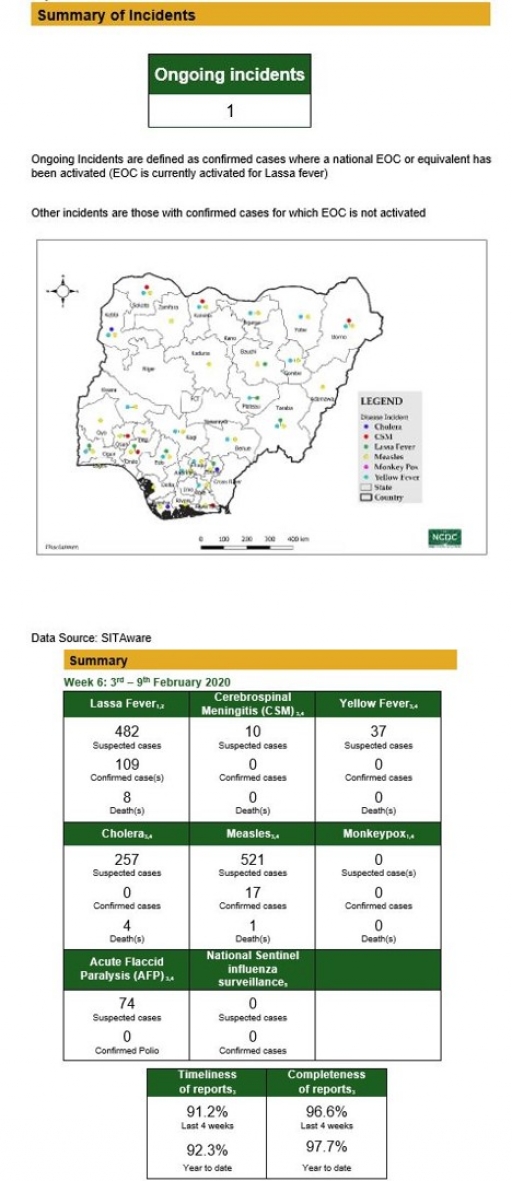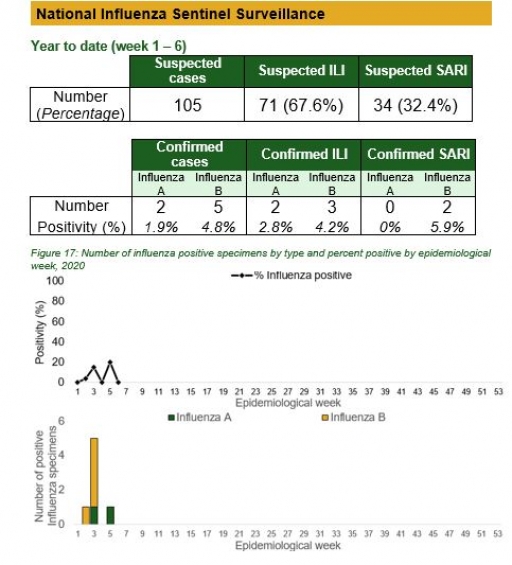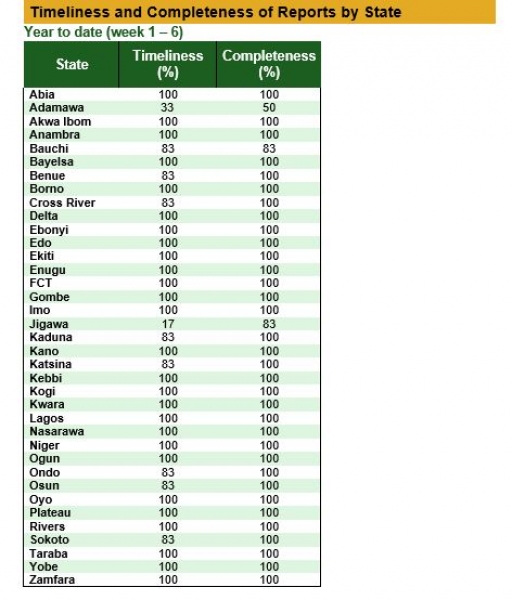Editoral
National Case Management Guidelines for COVID-19
Posted: 24-02-2020 10:28:07 AM
Since the beginning of the coronavirus disease (COVID-19) outbreak in China, the Nigeria Centre for Disease Control has continued to strengthen the level of preparedness in the country. As at the 23rd of February 2020, the virus had spread to 26 other countries.
As part of our preparedness, a Coronavirus Preparedness Group (CPG) was established by the Nigeria Centre for Disease Control (NCDC). This group includes representatives from the Port Health Services of the Federal Ministry of Health (FMOH), Health Promotion Division of the FMOH, Office of the National Security Adviser, Ministry of Defence Health Implementation Programme, Federal Ministry of Foreign Affairs, National Orientation Agency, World Health Organisation, World Bank, US Centre for Disease Control, Public Health England, Pro-Health International and Resolve to Save Lives.
The provision of specialised care is a critical component of COVID-19 response activities. In the last one month, NCDC has conducted further assessments in existing infectious disease treatment centres. This assessment has focused on identifying gaps and developing plans to rapidly ensure that we are prepared to manage all cases of COVID-19, regardless of the severity.
From the 17th – 19th of February, 2020, the Coronavirus Preparedness Group successfully conducted a workshop to develop protocols and guidelines for case management of COVID-19. These guidelines will be used by health care workers in providing care for patients, in the event of a COVID-19 outbreak in Nigeria.
The workshop which was supported by Resolve to Save Lives, had subject matter experts drawn from relevant specialised fields. This includes physicians, clinical virologists & nurses with MDR-TB management experience from teaching hospitals, WHO and other partners working closely with the National COVID-19 Preparedness Group.
An important outcome from the workshop was the development of an interim national case management guideline for COVID-19 highlighting:
1. Standard of management of COVID-19 cases
2. Sample collection procedure from suspect cases of COVID-19
3. Transfer of suspect / ill persons
4. Safe and dignified burial for suspect/confirmed cases
This guideline will be finalised and distributed widely to health care workers, starting from designated isolation and treatment centres in five priority states with international airports (Lagos, FCT, Kano, Rivers and Enugu) in Nigeria. The guideline will be made available on the NCDC website.
The Nigeria Centre for Disease Control remains committed to working with stakeholders, in improving the capacity of treatment centres to manage cases in the event of a COVID-19 outbreak.
Summary of Incidents
Notes
1. Information for this disease was retrieved from the Technical Working Group and Situation Reports
2. Case Fatality Rate (CFR) for this disease is reported for confirmed cases only
3. Information for this disease was retrieved from IDSR 002 data
4. CFR for this disease is reported for total cases i.e. suspected + confirmed
5. Information for sentinel influenza was retrieved from the laboratory

Lassa Fever
Key points
• There were 482 suspected cases, 109 confirmed cases and eight deaths recorded from 43 LGAs in 19 states
• Four new Health Care Workers were affected from Ondo, Delta and Kaduna states in the reporting week
Actions
To date:
• The National LF multi-partner, multi-sectoral EOC continues to coordinate the response activities at all levels
• Multi-sectoral, multi-disciplinary Public Health Emergency Operation Centres (PHEOC) activated in affected states
• Dissemination of reviewed IPC and safe burial guideline
• Establishment of Lassa fever laboratory at the Federal Medical Centre Owo
Planned:
• Support states to develop and implement Lassa fever response sustainability plan
• Operationalisation of LGA sanitation desks by Environmental Health Officers in all states
• Implement regular sanitation exercise in all states

Cerebrospinal Meningitis (CSM)
Key points
• There were 10 suspected cases of Cerebrospinal Meningitis (CSM) reported from eight LGAs in five states (Borno – 2, Ebonyi – 2, Katsina – 4, Ondo - 1 & Oyo – 1). None was laboratory confirmed and no death was recorded
Actions
To date:
• The National CSM TWG meets weekly to review reports from states and plan appropriately
• Enhanced surveillance in all states
Planned:
• Continue harmonisation of the national line list and SORMAS data
• Continue to ensure that states reporting cases send their line lists and collect CSM samples

Yellow Fever
Key points
• There were 37 suspected cases of yellow fever (YF) reported from 21 LGAs in 17 states. None was laboratory confirmed and no death was recorded
Actions
To date:
• The National multiagency YF Technical Working Group (TWG) is coordinating response activities
Planned:
• Continue to harmonise surveillance and laboratory data

Cholera
Key points
• There were 257 suspected cases of cholera reported from six LGAs (Abakaliki – 61, Afikpo North – 82, Ezza South – 2, Ivo – 66, Izzi – 44 & Ohaukwu - 2) in Ebonyi state. None was laboratory confirmed and four deaths were recorded
Actions
To date
• The National cholera multi-sectoral Technical Working Group (TWG) is monitoring all states and supporting already affected states
• Finalise the development of the 2020 cholera preparedness and response plan
Planned:
• Ensure that reporting states conduct rapid diagnostic test/culture test and send line list of all reported cases to the national level
• Continue follow up and monitoring of non-reporting states
• Continue harmonisation of the national line list and SORMAS data

Measles
Key points
• There were 521 suspected cases, 17 laboratory confirmed cases and one death reported from 180 LGAs in 30 states and FCT
Actions
To date
• The National Measles Technical Working Group (TWG) is closely monitoring surveillance data and response activities across the country
Planned:
• Continue the review of measles surveillance data across the country
• Continue harmonisation of the national line list and SORMAS data

Monkeypox
Key points
• There was no suspected case of monkeypox reported this week
Actions
• The National Monkeypox Technical Working Group (TWG) is monitoring activities in all states
Planned:
• Enhance surveillance for monkeypox in high burden states, working with animal health colleagues

Acute Flaccid Paralysis (AFP)
Key points
• There were 74 suspected cases of AFP reported from 63 LGAs in 22 states and FCT. None was laboratory confirmed and no death was recorded

National Influenza Sentinel Surveillance
Key points
• The subtypes A seasonal H3, 2009A/H1N1 and A/not subtyped account for 0(0.0%), 0(0.0%) and 2(100%) of the total influenza A positive samples respectively. The subtypes B VICTORIA, B Not subtyped and B Yamagata account for 0(0.0%), 5(100%) and 0(0.0%) of the total influenza B positive samples respectively
• The percentage influenza positive was highest in week 5 with 20%.

Timeliness and Completeness of Reports

Timeliness and Completeness of Reports by State














 Toll Free Number: 6232
Toll Free Number: 6232 Whatsapp: +234 708 711 0839
Whatsapp: +234 708 711 0839 SMS Number: +234 809 955 5577
SMS Number: +234 809 955 5577 